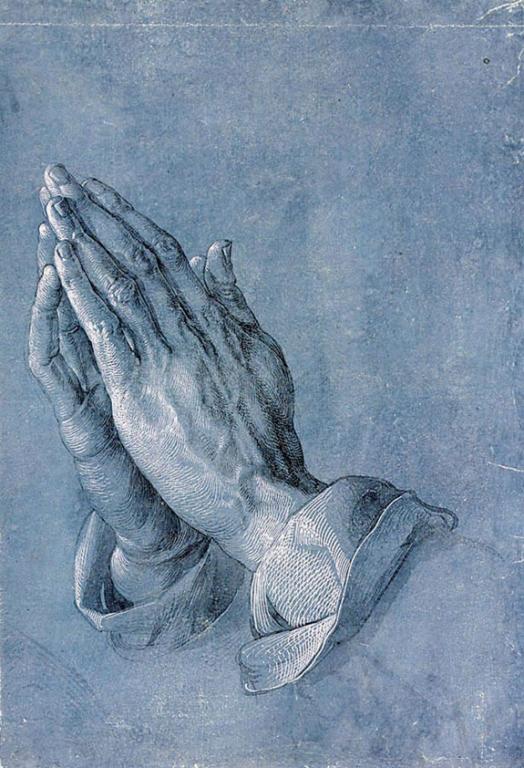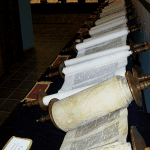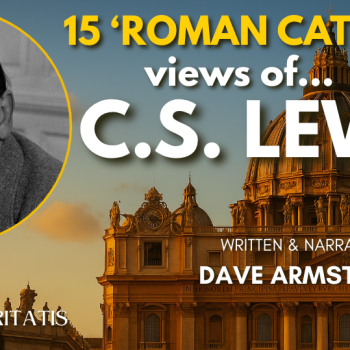
“If they leave that grey town behind it will not have been Hell. To any that leaves it, it is Purgatory. And perhaps ye had better not call this country Heaven. Not Deep Heaven, ye understand.” (Here he smiled at me). “Ye can call it the Valley of the Shadow of Life. And yet to those who stay here it will have been Heaven from the first. And ye can call those sad streets in the town yonder the Valley of the Shadow of Death: but to those who remain there they will have been Hell even from the beginning.”
Here is Lewis’ most explicit, extended treatment of the topic of purgatory, followed by an interesting short exposition from his famous semi-catechetical work, Mere Christianity:
Of course I pray for the dead. The action is so spontaneous, so all but inevitable, that only the most compulsive theological case against it would deter me. And I hardly know how the rest of my prayers would survive if those for the dead were forbidden. At our age the majority of those we love best are dead. What sort of intercourse with God could I have if what I love best were unmentionable to Him? . . .
I believe in purgatory. Mind you, the Reformers had good reasons for throwing doubt on “the Romish doctrine concerning Purgatory” as that Romish doctrine had then become. . . .
The right view returns magnificently in Newman’s Dream. [1] There, if I remember it rightly, the saved soul, at the very foot of the throne, begs to be taken away and cleansed. It cannot bear for a moment longer “With its darkness to affront that light.” Religion has reclaimed Purgatory.
Our souls demand Purgatory, don’t they? Would it not break the heart if God said to us, “It is true, my son, that your breath smells and your rags drip with mud and slime, but we are charitable here and no one will upbraid you with these things, nor draw away from you. Enter into the joy”? Should we not reply, “With submission, sir, and if there is no objection, I’d rather be cleaned first.” “It may hurt, you know” — “Even so, sir.”
I assume that the process of purification will normally involve suffering. Partly from tradition; partly because most real good that has been done me in this life has involved it. . . .
My favourite image on this matter comes from the dentist’s chair. I hope that when the tooth of life is drawn and I am “coming round,” a voice will say, “Rinse your mouth out with this.” This will be Purgatory. The rinsing may take longer than I can now imagine. The taste of this may be more fiery and astringent than my present sensibility could endure. (Letters to Malcolm: Chiefly on Prayer, New York: Harcourt Brace Jovanovich, 1964, 107-109)
“Make no mistake,” He says, “if you let me, I will make you perfect. The moment you put yourself in My hands, that is what you are in for. Nothing less, or other, than that. You have free will, and if you choose, you can push Me away. But if you do not push Me away, understand that I am going to see this job through. Whatever suffering it may cost you in your earthly life, whatever inconceivable purification it may cost you after death, whatever it costs Me, I will never rest, nor let you rest, until you are literally perfect — until My Father can say without reservation that He is well pleased with you, as He said He was well pleased with me. This I can do and will do. But I will not do anything less.” (Mere Christianity, New York: Macmillan, 1960, 172)
Lewis wrote about purgatory after the death of his wife, Joy:
How do I know that all her anguish is past? I never believed before — I thought it immensely improbable — that the faithfulest soul could leap straight into perfection and peace the moment death has rattled in the throat. It would be wishful thinking with a vengeance to take up that belief now . . . I know there are not only tears to be dried but stains to be scoured. . . .
But suppose that what you are up against is a surgeon whose intentions are wholly good. The kinder and more conscientious he is, the more inexorably he will go on cutting. If he yielded to your entreaties, if he stopped before the operation was complete, all the pain up to that point would have been useless. But is it credible that such extremities of torture should be necessary for us? Well, take your choice. The tortures occur. If they are unnecessary, then there is no God or a bad one. If there is a good God, then these tortures are necessary. For no even moderately good Being could possibly inflict or permit them if they weren’t.
Either way, we’re for it.
What do people mean when they say, “I am not afraid of God because I know He is good?” Have they never even been to a dentist? (A Grief Observed, New York: Bantam, 1976, 48-51)
In a letter to Sister Penelope, C.S.M.V., written on 17 September 1963, only nine weeks or so before his death, Lewis stated:
If you die first, and if “prison visiting” is allowed, come down and look me up in Purgatory. (W. H. Lewis, editor, Letters of C. S. Lewis, New York: Harcourt Brace Jovanovich, 1966 [revised and enlarged Harvest edition edited by Walter Hooper, 1993], 509)
Of course we should pray for the dead as I’m sure they do for us. (Letter to Mrs Percival Wiseman, 20 March 1944, p. 608)*[Y]ou, and she, will be in my prayers. (Letter to Arthur Greeves, 20 January 1949, p. 908; referring to his recently deceased mother)*I have never seen any more difficulty about praying for the dead than for the living, and it is quite clear that God wishes us to do that. (Letter to Rhona Bodle, 26 October 1949, p. 989)
Purgatory: a process by which the work of redemption continues, and first perhaps begins to be noticeable after death. (Letter to Mrs Johnson, 8 November 1952, p. 245)*[S]urely there is one person you very much want to pray for: your husband himself. . . . it seems to me quite possible that you can now help more than while he was alive. . . . Your present prayers for your husband are still part of the married life. (Letter to Phyllis Elinor Sandeman, 22 December 1953, pp. 392-393)*The doctrine of purgation after death is one of many held by the Roman Church which I consider to be intrinsically probable but which, since it is not clearly stated in Scripture, nor included in the early creeds, I do not think they have any warrant for enforcing. (Letter to Mr Allcock, 24 March 1955, pp. 587-588)*[Dave: I beg to respectfully differ as to whether it is “clearly stated in Scripture”; see:
Luther: Purgatory “Quite Plain” in 2 Maccabees [3-5-09]
50 Bible Passages on Purgatory & Analogous Processes [2009]
Raising of Tabitha: Proof of Purgatory (Tony Gerring) (see also in-depth Facebook discussion) [3-20-15]
50 Biblical Indications That Purgatory is Real [National Catholic Register, 10-24-16]
25 Descriptive and Clear Bible Passages About Purgatory [National Catholic Register, 5-7-17] ]
My wife died in July. I should be grateful if you would sometimes mention both her and me in your prayers. (Letter to Father Quinlan, 16 September 1960, p. 1185)
Thanks for your sympathy. I hope we both have your prayers (or don’t you pray for the dead?). (Letter to Alastair Fowler, 24 October 1960, p. 1201)
Thank you very much for your prayers for my wife. (Letter to Robin Anstey, 2 November 1960, p. 1206)
I know that you pour forth your prayers both for my dearly-longed-for wife and also for me . . . (Letter to Don Luigi Pedrollo, 8 April 1961, p. 1253)
Pray for us both. (Letter to Dom Bede Griffiths, 3 December 1961, p. 1300)
I’ve found the passage — 1 Cor. 15:20. Also 1 Pet 3:19-20, bears indirectly on the subject. It implies that something can be done for the dead. If so, why should we not pray for them? (Letter to Mary Van Deusen, 28 December 1961, p. 1307)
[actually the first passage Lewis refers to appears to be the following:
1 Corinthians 15:29 (RSV) Otherwise, what do people mean by being baptized on behalf of the dead? If the dead are not raised at all, why are people baptized on their behalf?
1 Peter 3:19-20 . . . he went and preached to the spirits in prison, [20] who formerly did not obey, when God’s patience waited in the days of Noah, during the building of the ark, in which a few, that is, eight persons, were saved through water. ]
[1] Here is the passage from St. John Henry Cardinal Newman’s poem The Dream of Gerontius (1865) that Lewis refers to (from “§ 4. Soul”):
Angel [partial stanza]
So is it now with thee, who hast not lost
Thy hand or foot, but all which made up man.
So will it be, until the joyous day
Of resurrection, when thou wilt regain
All thou hast lost, new-made and glorified.
How, even now, the consummated Saints
See God in heaven, I may not explicate;
Meanwhile, let it suffice thee to possess
Such means of converse as are granted thee,
Though, till that Beatific Vision, thou art blind;
For e’en thy purgatory, which comes like fire,
Is fire without its light.
Soul
His will be done!
I am not worthy e’er to see again
The face of day; far less His countenance,
Who is the very sun. Natheless in life,
When I looked forward to my purgatory,
It ever was my solace to believe,
That, ere I plunged amid the avenging flame,
I had one sight of Him to strengthen me.
Angel
Nor rash nor vain is that presentiment;
Yes,—for one moment thou shalt see thy Lord.
Thus will it be: what time thou art arraign’d
Before the dread tribunal, and thy lot
Is cast for ever, should it be to sit
On His right hand among His pure elect,
Then sight, or that which to the soul is sight,
As by a lightning-flash, will come to thee,
And thou shalt see, amid the dark profound,
Whom thy soul loveth, and would fain approach,—
One moment; but thou knowest not, my child,
What thou dost ask: that sight of the Most Fair
Will gladden thee, but it will pierce thee too.
Soul
Thou speakest darkly, Angel; and an awe
Falls on me, and a fear lest I be rash.
Angel
There was a mortal, who is now above
In the mid glory: he, when near to die,
Was given communion with the Crucified,—
Such, that the Master’s very wounds were stamp’d
Upon his flesh; and, from the agony
Which thrill’d through body and soul in that embrace,
Learn that the flame of the Everlasting Love
Doth burn ere it transform …
***
Related Reading:
C. S. Lewis’ Views on Christian Unity & Ecumenism [6-16-03]Contraception: Chesterton, C. S. Lewis, & Teddy Roosevelt [2-21-04]
C. S. Lewis’ Childhood in Belfast & Contra-Catholicism (Biographers and/or Friends Kreeft, Pearce, Derrick, and Possibly Tolkien Think This is Why Lewis Never Became a Catholic) [6-26-12]
Why Didn’t C. S. Lewis Become a Catholic? [8-29-14]
Dialogue on Why C. S. Lewis Didn’t “Pope” [9-1-15]
C. S. Lewis vs. St. Paul on Future Binding Church Authority [National Catholic Register, 1-22-17]
Why C. S. Lewis Never Became a Catholic [National Catholic Register, 3-5-17]
*
***
Unfortunately, Money Trees Do Not Exist: If you have been aided in any way by my work, or think it is valuable and worthwhile, please strongly consider financially supporting it (even $10 / month — a mere 33 cents a day — would be very helpful). I have been a full-time Catholic apologist since Dec. 2001, and have been writing Christian apologetics since 1981 (see my Resume). My work has been proven (by God’s grace alone) to be fruitful, in terms of changing lives (see the tangible evidences from unsolicited “testimonies”). I have to pay my bills like all of you: and have a (homeschooling) wife and three children still at home to provide for, and a mortgage to pay.
My book royalties from three bestsellers in the field (published in 2003-2007) have been decreasing, as has my overall income, making it increasingly difficult to make ends meet. I provide over 2500 free articles here, for the purpose of your edification and education, and have written 50 books. It’ll literally be a struggle to survive financially until Dec. 2020, when both my wife and I will start receiving Social Security. If you cannot contribute, I ask for your prayers. Thanks! See my information on how to donate (including 100% tax-deductible donations). It’s very simple to contribute to my apostolate via PayPal, if a tax deduction is not needed (my “business name” there is called “Catholic Used Book Service,” from my old bookselling days 17 or so years ago). May God abundantly bless you.
***
(originally 6-22-10; many more selections and links to my own papers on purgatory were added on 10-8-19)
Photo credit: Praying Hands, by Albrecht Dürer (1508) [public domain / Wikimedia Commons]
***













